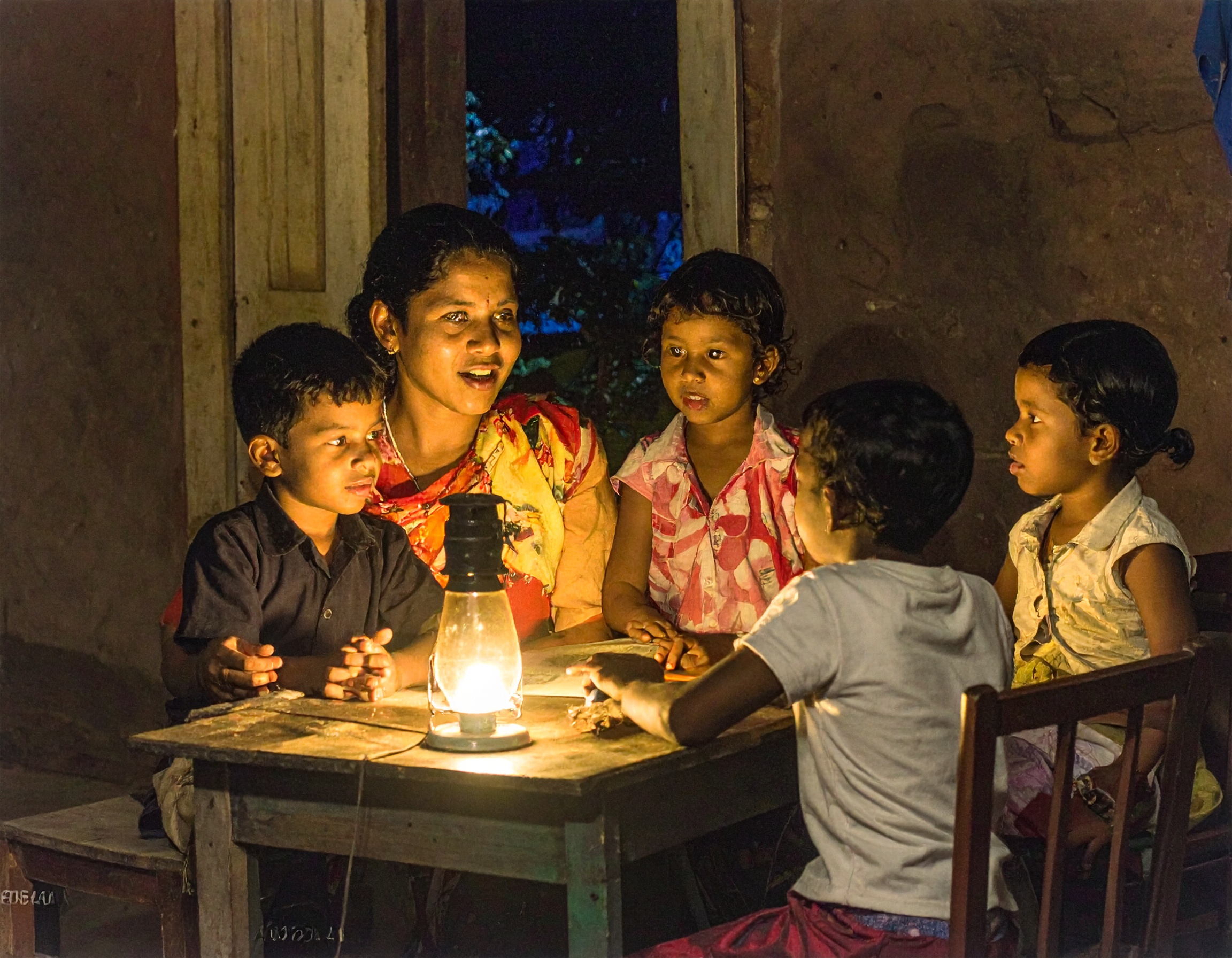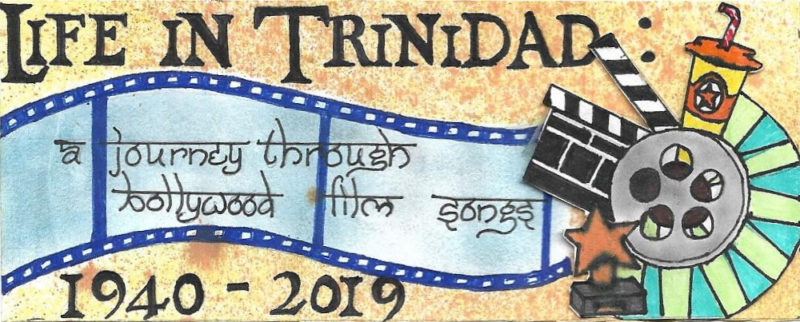- Bollywood and Beyond
The First Indian Movie I Heard About
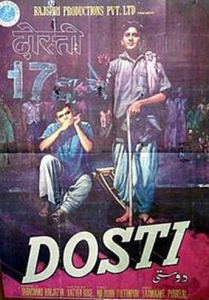
Dosti is an inspiring tale of friendship between two teenage boys, Ramu and Mohan. After losing his father and becoming crippled, Ramu is thrown out of his home and meets Mohan, a blind boy with a similar tragic background. Together, they earn money by performing on the streets of Mumbai.
Despite facing numerous hardships, including societal ridicule and personal betrayals, their bond remains strong. Ramu excels in his studies with Mohan’s unwavering support, while Mohan sacrifices his health to ensure Ramu’s success. The film highlights the themes of unwavering friendship, perseverance, and the power of human connection in overcoming life’s adversities.
It took Dosti a little over a year to come to Trinidad. This gave marketeers enough time to hype up the predominantly East Indian fans. Large billboards were strategically painted or stuck on cinema walls, picturesque advertisements decorated the newspapers and songs from the movie played repeatedly on the radio. Added to that, the loud mikes passing through villages during wedding processions would blare out the ‘catchy’ songs from Dosti.
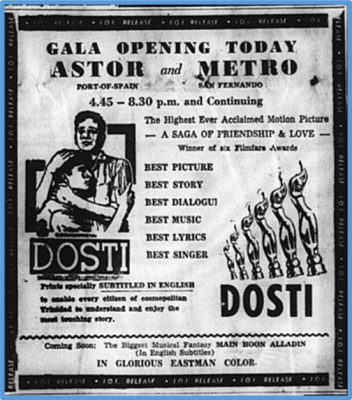
Dosti was released in Trinidad on October 21, 1965, three days before the annual Divali Day celebrations. This was my first Divali, although I can remember nothing of that auspicious day, having made my entry into the world only six months before. Back then, Divali Day was a low-keyed occasion, observed mainly in the private domain by Hindus, as part of their customary religious practices without any special national recognition. This changed the following year, 1966, when the government proclaimed Divali Day an annual public holiday in Trinidad and Tobago. From that time onwards, Hindus were free to devote an entire day to Divali preparations and celebrations, which became more lavish as the years went by.
By the time Dosti reached the shores of Trinidad, it had won six Filmfare awards from the seven nominations it had received, including Best Film for 1964. In addition, Dosti was declared a “Super Hit” at the Box Office, as it became India’s 3rd highest grossing film for 1964. The advertisement on the left prominently highlights the six Filmfare awards.
Dosti was also a big hit in Trinidad. It ran for three weeks at the Astor cinema in Port-of-Spain and the Metro cinema in San Fernando where it was first released. The following advertisements appeared in the Trinidad Guardian in the first two weeks of its release in Trinidad.


Advertisements for Dosti, Trinidad Guardian, October-November 1965
My earliest memory of Dosti was my mother telling my sisters and me little bits and pieces of the story each night before we fell asleep. As a child, I loved stories so I struggled to stay awake each night to find out the next thing that would happen in the movie, as narrated by my mother. I remember those nights clearly. We were always on our best behaviour. Not a sound could be heard in the quietness of the night, except my mother’s voice talking excitedly about the movie, as the kerosene lamp flickered nearby in the dark house.
Although electricity was widely available in Trinidad at the time, there was no electricity at home, as we lived a little distance away from the main electricity lines. I could not imagine what a cinema was like. I had previously seen a few TV shows such as Voyage to the Bottom of the Sea, Hogan’s Heroes, Bonanza etc. at the homes of neighbors, so I had a vague idea that one could see “moving pictures” at a cinema.
I don’t believe my mother saw Dosti when it was first released because I would have been too young to remember her nightly stories. As was the custom in those days, an Indian movie would first be displayed at the two biggest towns in the country, Port-of-Spain and San Fernando. In the weeks and months after, the movie would be shown in smaller towns around the country, finally ending up in the least populated towns. This was because there were only two or three physical “prints” of the movie in the country so the cinemas throughout the country had to wait their turn to receive one of the prints.
Pepper Village, where we lived is about 8 miles from the closest town, Couva. There were two cinemas in Couva, the Metro and the Reno. Indian movies were mostly shown at the Metro. Regular show times were around 4:30 pm and 8:30 pm. Since the taxis from my village to Couva stopped their operations after dark, it was difficult to go to a movie in Couva unless it was on a Saturday, when there was an early show around 12:30 pm.
Even so, with three little children on her hands, it would have been difficult for my mother to travel to Couva to see Dosti when it was first released. However, there would be other opportunities to see the movie in future years since it was common for cinema operators to repeat the showing of successful movies in later years. This is probably how my mother got to see Dosti, about three years later with my sister.
Although I longed to see Dosti, I didn’t get a chance to see it until many more years had passed. Apart from my mother’s nightly segments, my only other memory of Dosti was the songs. Of all the Indian movie song albums that I am familiar with, I rank the songs of Dosti in the top 5. The songs of Mohammed Rafi were simply unforgettable. After more than 60 years, there is probably no one in the East Indian community who is not familiar with “Chahunga Mai Tujhe Sanjh Sawere”. Mohammed Rafi was awarded Fllmfare’s Best Playback Singer of 1964 for this song (he had already won two, one in 1960 and one in 1961).
Two songs from Dosti will now be featured. The first song is “Chahunga Mai Tujhe Sanjh Sawere”, which Mohan sings as he wanders aimlessly from place to place after being rejected by his friend, Ramu. Mohan makes it abundantly clear in the song that he will never again call out the name of his friend, Ramu, even though he longs for Ramu day and night.
Music video of Chahunga Mai Tujhe Sanjh Sawere from the movie Dosti
| Mohammed Rafi | Mohammed Rafi |
| Chahunga mai tujhe sanjh sawere Phir bhi kabhi abb nam ko tere Aawaj mai naa dunga Aawaj mai naa dunga Chahunga mai tujhe sanjh sawere Phir bhi kabhi abb nam ko tere Aawaj mai naa dunga Aawaj mai naa dunga Chahunga mai tujhe sanjh sawere | I shall yearn for you day and night Despite this, never again will your name … … be called out by me Be called out by me I shall yearn for you day and night Despite this, never again will your name … … be called out by me Be called out by me I shall yearn for you day and night |
| Dekh mujhe sab hai pata Sunta hai too mann ki sada Dekh mujhe sab hai pata Sunta hai too mann ki sada Mitwa mere yar Tujhko bar bar aawaj mai naa dunga Aawaj mai naa dunga Chahunga mai tujhe sanjh sawere Phir bhi kabhi abb nam ko tere Aawaj mai naa dunga Aawaj mai naa dunga Chahunga mai tujhe sanjh sawere | Look, I know everything That you always listen to your heart Look, I know everything That you always listen to your heart Buddy, my pal … … you won’t be called out by me again and again Be called out by me I shall yearn for you day and night Despite this, never again will your name … … be called out by me Be called out by me I shall yearn for you day and night |
| Dard bhi too chain bhi too Daras bhi too nain bhi too Dard bhi too chain bhi too Daras bhi too nain bhi too Mitwa mere yar Tujhko bar bar aawaj mai naa dunga Aawaj mai naa dunga Chahunga mai tujhe sanjh sawere Phir bhi kabhi abb nam ko tere Aawaj mai naa dunga Aawaj mai naa dunga Aawaj mai naa dunga Aawaj mai naa dunga | You are a pain to me, you are also my comfort You are my sight, you are also my eyes You are a pain to me, you are also my comfort You are my sight, you are also my eyes Buddy, my pal … … you won’t be called out by me again and again Be called out by me I shall yearn for you day and night Despite this, never again will your name … … be called out by me Be called out by me Be called out by me Be called out by me |
The second song is, “Raahi Manwa Dukh Ki Chinta”. Just before the song starts in the movie, Ramu and Mohan visit a young girl, Manjula, and asks her for a loan of sixty rupees, the exact amount required to pay Ramu’s school fees. Manjula’s brother rebuffs them and gives them only five rupees. They walk away, feeling insulted and dejected. Mohan decides to raise the money for Ramu by singing. He looks at the dejected Ramu and delivers a beautiful discourse about the role of sadness in life.
Music video of Raahi Manwa Dukh Ki Chinta from the movie Dosti
| Mohammed Rafi | Mohammed Rafi |
| dukh ho ya such jab sada sang rahe na koye phir dukh ko apnayiye ke jaye to dukh na hoye | Be it sadness or happiness Neither one stays with us forever … … so, why not embrace sadness Since there is no more sadness when we die |
| raahi manva dukh ki chinta kyon sataati hai dukh to apna saathi hai raahi manva dukh ki chinta kyon sataati hai dukh to apna saathi hai sukh hai ek chhaaon dhalti Aati hai jaati hai dukh to apna saathi hai raahi manva dukh ki chinta kyon sataati hai dukh to apna saathi hai | O traveller, why do you worry about sadness? Sadness is our companion O traveller, why do you worry about sadness? Sadness is our companion Happiness is but a transient shadow It comes and goes Sadness is our companion O traveller, why do you worry about sadness? Sadness is our companion |
| door hai manzil door sahi pyar hamaara kya kam hai pag mein kaante laakh sahi par ye sahaara kya kam hai hamraah tere koi apna to hai hamraah tere koi apna to hai ho o, sukh hai ek chhaaon dhalti Aati hai jaati hai dukh to apna saathi hai | Our destination is somewhere afar Is our love any less? Even if there are many thorns in our path Won’t we continue to support each other? My friend, at least you have someone My friend, at least you have someone Happiness is but a transient shadow It comes and goes Sadness is our companion |
| raahi manva dukh ki chinta kyon sataati hai dukh to apna saathi hai dukh ho koi tab jalte hain path ke deep nigaahon mein itni badi is duniya ki lambi akeli raahon mein hamraah tere koi apna to hai hamraah tere koi apna to hai ho o, sukh hai ek chhaaon dhalti Aati hai jaati hai dukh to apna saathi hai raahi manva dukh ki chinta kyon sataati hai dukh to apna saathi hai dukh to apna saathi hai dukh to apna saathi hai | O traveller, why do you worry about sadness? Sadness is our companion Even when we are sad, We see the way through our eyes In such a big world On its long and lonely streets My friend, at least you have someone My friend, at least you have someone Happiness is but a transient shadow It comes and goes Sadness is our companion O traveller, why do you worry about sadness? Sadness is our companion Sadness is our companion Sadness is our companion |
Permanand Mohan
Related Posts
Testing Why Comments Are Disappearing
Testing Why Comments Are Disappearing October 29, 2025inShadows of the PastEchoes of the PastBollywood and BeyondByPermanand MohanCommentComments(5) Previous PostOne Small

One Small Step For Me
This blog post offers a personal glimpse into life in Trinidad around 1969, a time marked by the transformative global
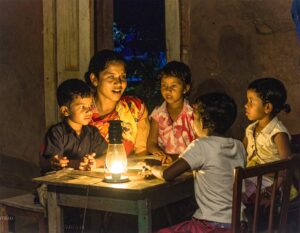
The First Indian Movie I Heard About
My early life began at Pepper Village, Gran Couva. A beautiful, scenic village covered with its lush green, undulating landscape,
